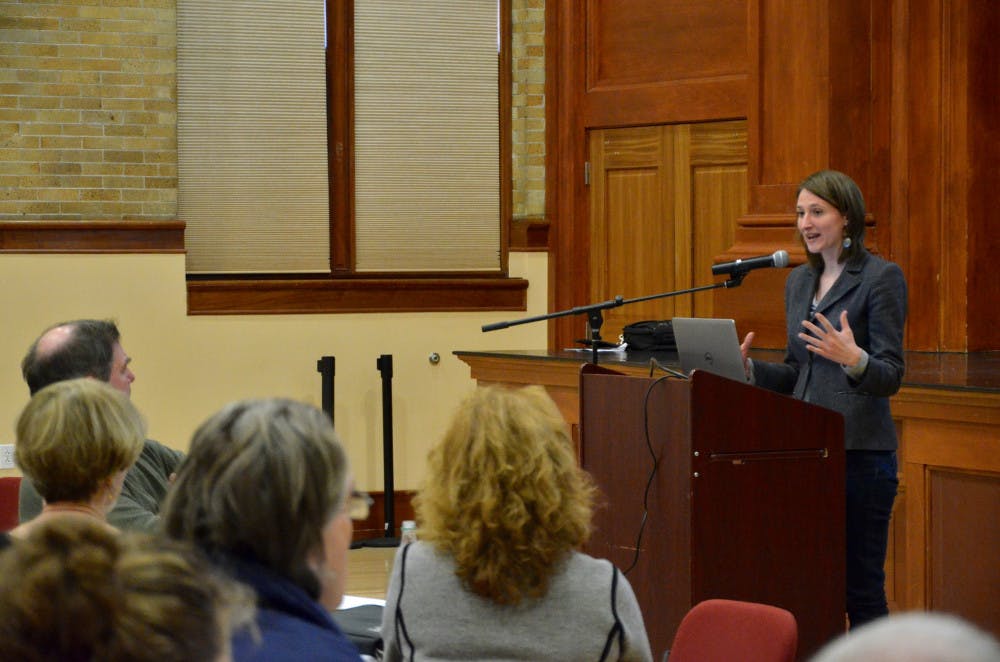On April 2, a motley crew of professors, students and local denizens came together to share in a discussion titled “Acting Righteously in Times of Danger.”
The event sought to spark conversation regarding two key questions: “When others are threatened in times of danger, what is it that moves us to act courageously on their behalf and risk our own safety and those closest to us?” and “How do we foster tolerance, understanding, empathy and courage?”
To help guide the exploration of such nebulous — and fundamental — questions, the audience was first given an exceptional anecdote from the film “Two Who Dared,” whose chosen center is on Martha and Waitstill Sharp, two Americans “who played a vital role in saving hundreds from persecution during World War II.” As one might expect, any literal comparison between the Sharps’ life and that of most Middlebury students would be unfair.
However, when attention turned towards the values that guided the Sharps, an enlightening and applicable conclusion was reached. As one of the older participants said, “If Middlebury students want to spread the values they hold dear, they must first devote themselves to those ideals in the day-to-day, the mundane. This isn’t a new thought, but it is underappreciated.”
The Sharps’ lives were, above all else, defined by an unwavering devotion to virtue. In “Two Who Dared,” one of the main points of emphasis was that Waitstill and Martha Sharp were the 18th choice for relief volunteers. The 17 previous ministers declined for understandable reasons: young children, a job and a stable life. The Sharps were different. Waitstill often used the word “must” while describing why he and Martha made the decision to go on both of the two missions, the first to Prague and the second to Southern France during the German invasion. They had two young children, a stable job and a stable life, yet Waitstill continued to use that decisive word. The discussion group had some trouble with this — why must they leave their children? Why must they give up their lives when there were those who were better equipped?
One attendee saw the reasoning to be simple, remarking, “It’s a matter of holding true to your virtues. It seemed as though they — Waitstill especially — didn’t see a choice. If they didn’t live by the idea of absolute equality in every action then they just couldn’t be equipped to create equality.”
Although this sentiment did not hit home with some in the room — seeing as much of the space was filled with mothers and fathers — many believed it could very well be the Sharps’ perspective. In either case, Waitstill and Martha had an undeniable impact. During these two tours, the Sharps helped over one hundred refugees find safety and security, and were “recognized by the state of Israel as Righteous Among the Nations for risking their lives to save Jews and dissidents during the Holocaust.”
The Sharps’ story is an extreme one. Leaving one’s children in their most formative years for a potentially life-threatening mission is not something most parents feel they “must do.” It is certainly not something any student can fully appreciate at this point in their lives. As such, much of the conversation turned towards the realm of moral take-aways rather than literal ones. The take-away: it is the little choices we make every day that create real change, not implausible end goals.
Seeing as the College’s Board of Trustees have outwardly lauded the College as the first global liberal arts institution, it seems as though its students would be some of the best at enacting sweeping change.
But one student solemnly asked, “How can we consider ourselves to be the best equipped if many of us don’t stand by the virtues of equality and fairness when we don’t respect something as small as peer proctoring?”
For a student, one of the most common “little choices” is to respect the tradition of peer proctoring. Although it may not seem comparable to the idea of gender equality, for example, it is less a matter of the topic and more about the fundamental value driving any sort of change.
As Lecturer in Religion and GSFS Maria Hatjigeorgiou stated after the discussion, “Even at a school like Middlebury, the most important class is that of the students ‘walking the walk.’”
That is to say, it is not enough to learn what equality is; it must also practice such virtues on a day-to-day and moment-to-moment basis. To this sentiment, Adrian Leong ’16 added, “Being virtuous does not have to be known all the time: we delude ourselves to think that until a grand goal is reached, our efforts are without worth.”
By the conclusion of the discussion and event as a whole, a consensus of sorts was reached. Students at the College, like all students, teachers and human beings, are shaped by our daily interactions with the world. Although something as uncelebrated as taking peer proctoring seriously is not “acting righteously in a time of danger,” it equips students to spark just as much change as any class or peer-proctored exam.
Students Discuss Righteous Action and Empathy

Comments


